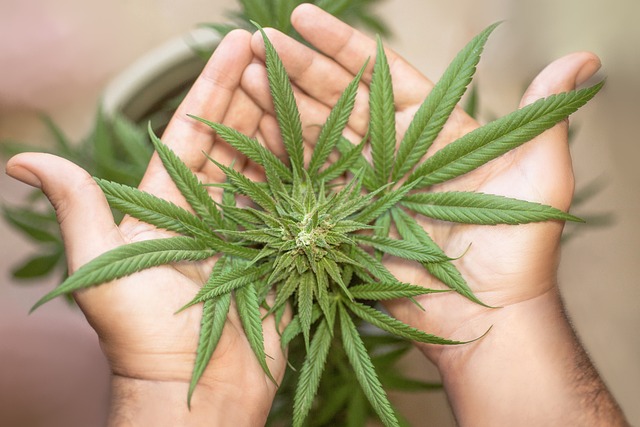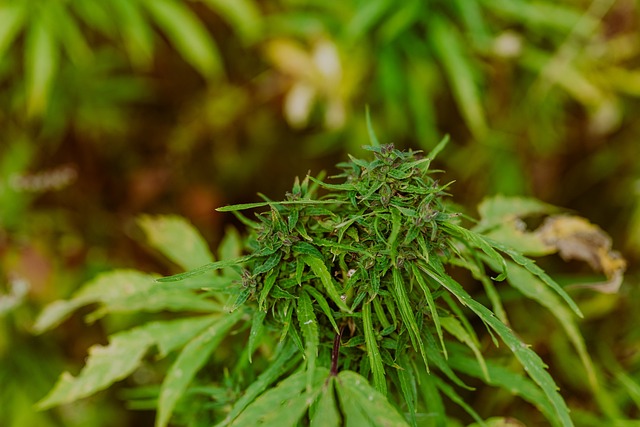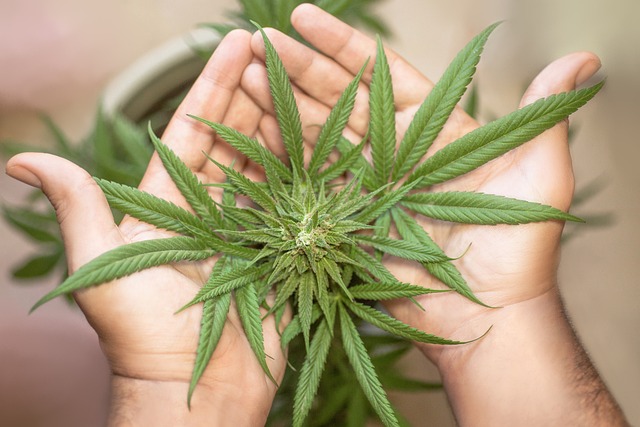THCA buds for relaxation are non-psychoactive and derived from raw cannabis plants. They contain THCA, which, after decarboxylation, turns into the psychoactive THC. Users report that consuming THCA buds provides a calming effect without the impairment associated with THC. This is because THCA interacts with the endocannabinoid system, influencing mood and pain regulation, and potentially offering benefits like neuroprotection, anti-inflammatory properties, and appetite enhancement. Unlike THC, THCA is sought after for its therapeutic potential without cognitive alterations, making it a popular choice within the wellness industry as an alternative for stress and anxiety relief. The focus on THCA buds reflects the growing interest in cannabinoid research and their diverse applications, emphasizing their relaxation properties. Users should approach them responsibly, considering personal tolerance and consulting healthcare professionals, especially given the variability in individual responses to cannabinoids. It's also important to source high-quality THCA buds legally and responsibly, aligning with local laws and regulations on cannabis use.
Exploring the nuanced effects and potential side effects of THCA flower, this article unravels the multifaceted impact of this cannabinoid-rich compound on well-being. From its distinct chemical composition to how it interacts with the body’s endocannabinoid system, we delve into the unique properties of THCA buds for relaxation. We examine the role of terpenes, safety considerations, and legal status, providing a comprehensive guide to understanding and responsibly incorporating THCA flower into your routine. This exploration includes analyzing user experiences, addressing common misconceptions, and comparing its side effects with traditional relaxants, ensuring you are well-informed on both the benefits and potential adverse reactions of this natural substance.
- Understanding THCA Flower and Its Potential Benefits
- The Chemical Structure of THCA and Its Interaction with the Body
- THCA Buds for Relaxation: A Closer Look at Their Effects
Understanding THCA Flower and Its Potential Benefits

THCA, or tetrahydrocannabinolic acid, is a non-psychoactive cannabinoid found in the raw cannabis plant, which, when heated or decarboxylated, converts into the more well-known psychoactive compound THC. THCA buds have gained attention for their potential therapeutic properties and are often cited for their role in relaxation. These buds contain high levels of THCA as opposed to THC, suggesting a different effect profile. Users report that THCA buds can induce a calming sensation without the intoxicating effects typically associated with cannabis. This makes them appealing for those seeking relief from stress or anxiety without altering their cognitive state.
Research indicates that THCA may interact with the body’s endocannabinoid system, which plays a significant role in regulating mood and pain sensation. The potential benefits of THCA flower are being explored in various areas, including neuroprotection, anti-inflammatory effects, and as an appetite stimulant. Its relaxing properties are particularly noteworthy for individuals seeking a natural approach to unwind or manage mild anxiety without the concerns associated with psychoactive substances. As interest in cannabinoids grows, so does the research into their various applications and benefits, positioning THCA buds as a promising area of study within the wellness industry.
The Chemical Structure of THCA and Its Interaction with the Body

Tetrahydrocannabinolic acid (THCA) is the non-psychoactive precursor to THC, the primary psychoactive component found in cannabis plants. THCA exists naturally in raw cannabis flowers and is converted into THC when the plant material is heated, a process that occurs during combustion or vaporization. The chemical structure of THCA consists of a pentcyclic ring system fused to an open-chain alkanoid with an additional functional group, an acid group (-COOH), which differentiates it from its psychoactive counterpart, THC. This carboxylic acid group plays a crucial role in the molecule’s interaction with the body’s endocannabinoid system (ECS).
The ECS is a complex cell-signaling system identified in the early 1990s and is responsible for regulating a range of physiological processes, including mood, pain sensation, inflammation, and memory. THCA interacts with the ECS by binding to both cannabinoid receptor types, CB1 and CB2, albeit less potently than its decarboxylated form, THC. This interaction can influence a variety of bodily functions and is believed to contribute to the therapeutic properties associated with cannabis, such as those found in THCA buds for relaxation. Users often consume raw cannabis flowers or extracts containing high levels of THCA for its potential calming effects without the psychoactive “high” associated with THC. The interaction of THCA with the ECS is thought to promote a sense of tranquility and relaxation, making it a popular choice for those seeking the therapeutic benefits of cannabis without cognitive impairment. As such, THCA’s potential side effects, while less studied than THC’s, are generally considered milder, though they can include drowsiness, dry mouth, or reduced blood pressure, especially when consumed in large quantities.
THCA Buds for Relaxation: A Closer Look at Their Effects

THCA, or Tetrahydrocannabinolic Acid, is a non-psychoactive cannabinoid found in raw cannabis plants and is the precursor to THC, the most well-known cannabinoid. THCA buds, rich in this compound, are increasingly being explored for their potential relaxation effects. Users report that THCA buds may offer a calming and soothing sensation without the psychoactive ‘high’ associated with its decarboxylated form, THC. This is particularly appealing to those seeking the therapeutic benefits of cannabis without cognitive impairment. The effects of THCA are thought to stem from its interaction with the body’s endocannabinoid system, which plays a role in regulating mood and pain sensation. When consumed in their natural state, THCA buds may provide a gentle yet potent relaxing experience, making them a subject of interest for individuals seeking relief from daily stressors or mild anxiety without the mind-altering effects of THC.
Furthermore, anecdotal evidence and emerging research suggest that THCA buds might offer anti-inflammatory properties and could potentially alleviate pain and discomfort associated with certain conditions. Users often report a sense of tranquility and ease in their physical bodies when using THCA buds for relaxation, which can be particularly beneficial before bedtime or during moments of heightened stress. It’s important to approach the use of THCA buds with caution, as individual responses to cannabinoids can vary greatly, and the optimal dosage and method of consumption should be determined based on personal tolerance and the advice of a healthcare professional. Always ensure that you are sourcing THCA buds from reputable suppliers, and adhere to local laws and regulations regarding the use of cannabis products.
In conclusion, THCA flower has garnered attention for its potential therapeutic and relaxing properties. The unique chemical structure of THCA interacts with our body’s endocannabinoid system, which may offer various benefits without the psychoactive effects associated with delta-9-tetrahydrocannabinol (THC). While the full scope of its effects is still under scientific investigation, anecdotal evidence and preliminary research suggest that THCA buds for relaxation could be a valuable addition to wellness routines. As with any new supplement or treatment, it is advisable to consult with a healthcare professional before incorporating THCA flower into your regimen, ensuring the safe and effective use of this compound.
